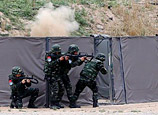
Shenzhou X astronauts return in good health after 15-day mission
With the safe return to Earth on Wednesday of three astronauts after a successful 15-day mission, China moved a step closer to realizing its space dream, which includes operating a space station by 2020.
Wang Zhaoyao, director of the China Manned Space Agency, released a more detailed outline for the manned space program.
He said in Beijing the manned space program will launch the Tiangong-2 space laboratory around 2015, and an experimental core space station module around 2018. The aim is to build a 60-ton multimodule space station by 2020.
Between 2015 and 2020, a string of cargo and manned spacecraft will be launched to deliver supplies and transport astronauts to the space lab and space station, he said.
Wang did not say how much will be spent on the forthcoming missions, but said the Shenzhou X mission that ended on Wednesday took spending on the manned space program to 39 billion yuan ($6.35 billion) since it was started in 1992.
He also said construction of a new launch site in Hainan province and development of two new types of launch vehicle — both crucial elements in the space program's next stage — have made smooth progress.
The new launch site's main infrastructure has been completed, including the testing laboratories for carrier rockets and spacecraft, Wang said.
The construction progress means that joint exercises and follow-up tasks can be carried out according to plan, he added.
Yuan Jie, deputy general manager of the China Aerospace Science and Technology Corp, said the new site will see the launch of two types of China's new-generation carrier rockets.
As the carrier rockets in service now cannot meet demand from the future manned space station, the large-thrust Long March-5 carrier rocket, with the capacity of carrying a 20-ton payload in near-Earth orbit, will send space station modules into orbit, he said.
Meanwhile, the medium-thrust Long March-7 launch vehicle, with a carrying capacity of 13 tons in near-Earth orbit, will be used to send cargo spacecraft to the future manned space station, Yuan said.
"Development of both types of new launch vehicles is going smoothly. Their maiden flights are expected to be carried out during the 12th Five-Year Plan period (2011-15)," he said.
 |
















 Wait and See!
Wait and See!
I can catch you, rats


![]()
